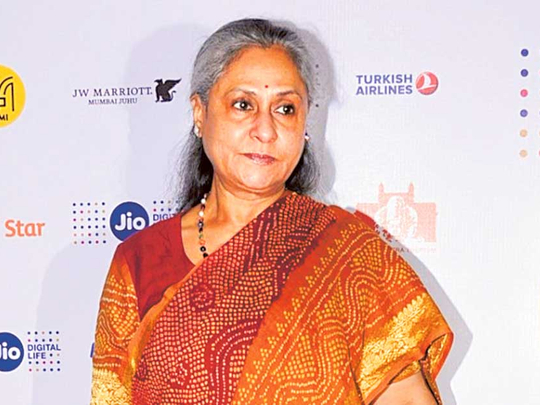
Veteran actress Jaya Bachchan says films these days are vastly different from those made in the 1950s and 1960s, and that’s not a good thing.
“Filmmakers at that time, created art. Today, it’s a business and all about numbers. Everything is thrown at our face. People have forgotten subtlety. Open display of affection is considered smart... sharam naam ki toh cheese hee nahi hai [people are no longer ashamed]. Now, it’s about big collections at the box office, Rs100 crore [Rs 1 billion, Dh54.9 million] films, first weekend collection... It’s all Greek to me,” said the 68-year-old actress, known for films such as Guddi, Abhimaan and Silsila.
Bachchan was talking at a session about the late filmmaker Bimal Roy at the Jio Mami 18th Mumbai Film Festival with Star on Tuesday.
The actress believes most characters in Bollywood are inspired by the west.
“I don’t know why. Maybe, they are richer countries and are considered more progressive. But I think the Indian mind is very progressive,” she said.
Bachchan, whose belongs to the illustrious Bollywood family, says there are a few films that properly represent Indian culture.
“People like Aligarh and Masaan because they show the real India and real problems of India,” said the wife of actor Amitabh Bachchan.
Emphasising that cinema is a visual medium, she said that emotions can be show in a subtle way, without being loud.
“I get stressed out when I see this kind of cinema. I need to run away to some quiet place,” said the actress.
Roy’s son Joy Roy, who was also at the session, also had his criticisms of films today.
“Earlier, there used to be a vamp and a heroine. But now, there is no need for a vamp because the heroine does exactly what a vamp does. She wears itsy bitsy clothes and dances,” he said.
“Regional cinema stays true to India. It’s Bollywood that is married to money. Bollywood is mostly made by Mumbai-centric people influenced by the west. Even their thought process is Eestern. They look at western cinema. That’s why there are so many rip-offs [of western movies],” he added.
Another panellist, screenwriter and editor Apurva Asrani, said that the audience also needs to take responsibility. He said that Chaitanya Tamhane’s critically acclaimed Marathi film Court, which was selected as India’s official entry to the Oscars last year, didn’t have many viewers when it was screened at a festival.
“We, as an audience, need to take the responsibility ourselves instead of pointing at Bollywood. The industry... it is also a trade. They are catering to you,” he said.











